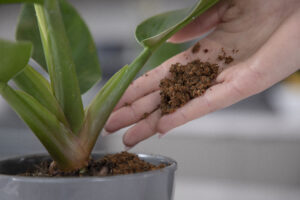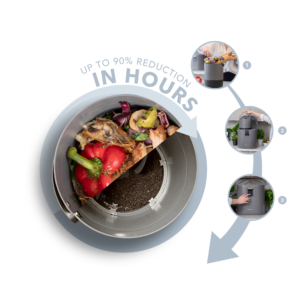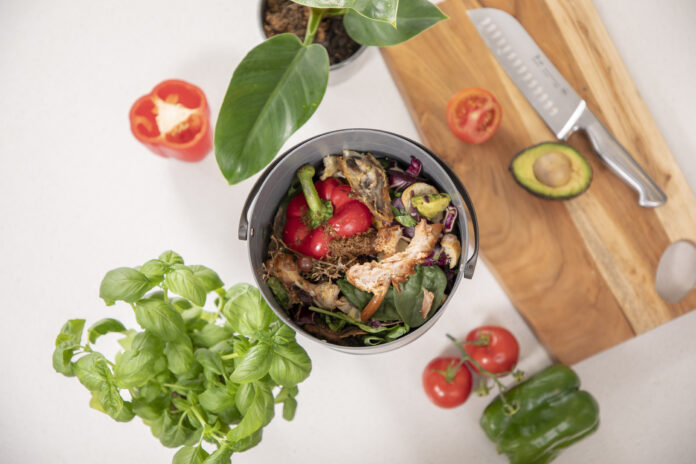Nelson’s pre-treated organics program aims to positively impact household waste management while also providing multiple environmental benefits.
The City of Nelson has officially launched their pre-treated organics program pilot, which will see 1,600 FoodCycler appliances distributed to households in Fairview and residents who signed up for early adoption of the program.
The official launch of the program was announced last week, but Emily Mask the climate program coordinator with the city, says they began rolling the appliances out at the end of May.
Out of the 1,600 units, 500 have been distributed to those who signed up as early adopters. The remaining appliances are being rolled out to the pilot neighborhood in Fairview.
The idea of developing a pre-treated organics program in Nelson was brought up by a Nelson city councilor in 2019. A Google search for an organic waste diversion alternative led to the discovery of a company manufacturing household waste diversion appliances called the FoodCycler.
The FoodCycler is a small, countertop appliance that diverts organic waste into a dry soil amendment rich in nutrients that can be used in gardens or dropped off at one of the two diverted waste bins in the city.
For Fairview participants, a drop off bin is located at Safeway and free to use 24/7. Early adopters will use one located at the public works building on Lakeside Drive.
In 2020 Nelson rolled out the first pre-treated organics pilot program which saw 250 participants studied to identify whether the appliance could divert more household waste than a curbside program.
Mask says the initial pilot results were astounding, which encouraged council to find ways to implement the program community wide.
“With the new pilot, we’re looking to enrich those results to confirm what we found, which is that the appliance could divert more household waste than a traditional wet curbside program. But that’s still to be confirmed through our research in this pilot. A 250-person pilot is great, but 1,600-person pilot is amazing.”
There was a high level of compliance during the 2020 pilot as it identified a significant number of benefits to participants, Mask said
Mask explained that common barriers residents face when diverting waste, such as wildlife attraction and access to collection bins, were diminished, making it easy for people to incorporate waste diversion into their daily routines.
With the pilot expansion to over a thousand households, researchers will have the ability to gather more accurate information on the program’s impact on both residents and in the local waste stream.
“We’re very confident in the FoodCycler’s ability to divert organic waste, but we are really excited to learn more on what it does on a municipal program. We will be evaluating and learning from this, and it will all gear us up and give us the information we need for a citywide program and to decide on our next steps.”
The city is waiting for a waste stream audit to identify how much of the local stream contains organics, although Mask says the provincial standard states it makes up about 35 per cent.
Regardless of the audit results, a solution to limit organics waste in the city is essential, seeing as organic waste has a higher warming potential than any other waste products, she said
The pilot project is anticipated to have multiple benefits to the community outside of organic waste reduction, according to Mask who says the overall goal is to ease household waste management.
“It’s not just diverting organics out of the waste stream. It’s pest management. It’s keeping wildlife out of your backyard. It gives you an easier way to deal with your waste, which in turn means there’s less urgency to bring your garbage out to the curb because it doesn’t contain organics.

(Courtesy of Emily Mask/City of Nelson)
“It’s not going to stink up your garage, it makes garbage lighter and easier to deal with. There are so many co-benefits including access to the soil amendment, which is amazing to enrich your backyard garden.”
Mask says results from the initial pilot showed that the drop off method for the diverted waste byproduct was not frequently used, identifying that residents were using the nutrient-rich amendment in their gardens. However they will study whether a curbside pickup program would benefit residents.
The city will do short-term and long-term evaluations on the organic waste levels in the waste stream and on feedback from participants. Mask says it should only take a few months of short-term evaluation to identify whether the pilot could be adopted city-wide.
All residents signed up on the early adopters list have received their appliance already, and the rollout in Fairview is well underway.
However, Mask encourages eligible residents who haven’t received their appliance yet to call the city or visit their website to arrange a pickup method.
“We’ve had a lot of people ask when they can pick up their appliance. We want them to know that they can sign up online, and then we will contact them through an email with an invitation,” she said
“Once we check out all their information and make sure it’s valid, we arrange for them to pick up their appliance. Our campaign has just started, so we are just getting our messages out that folks can sign up.”







